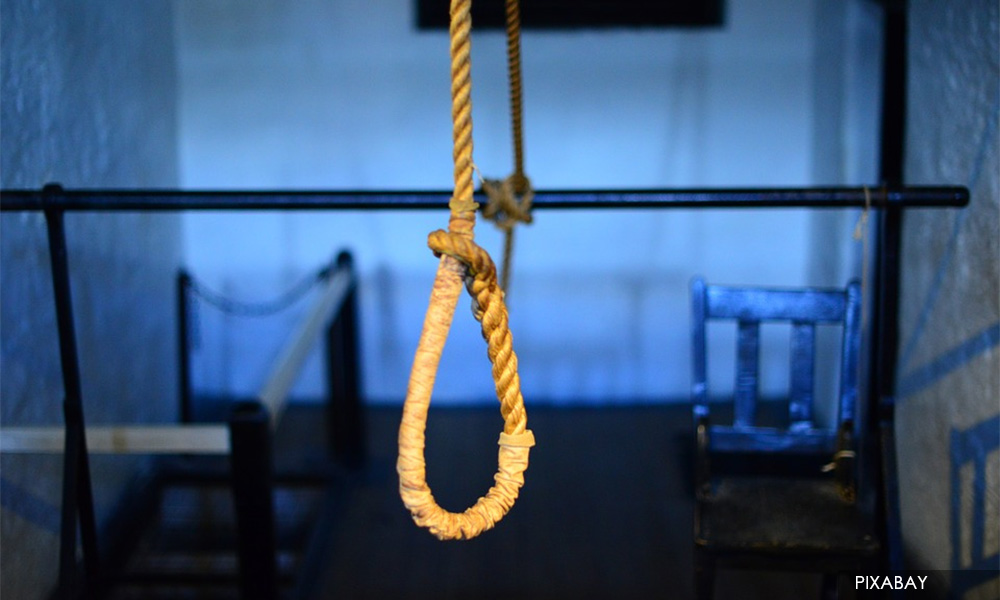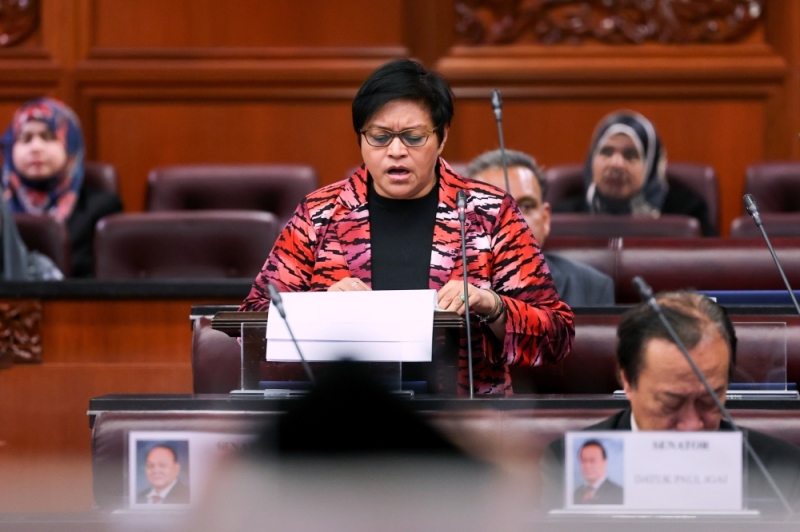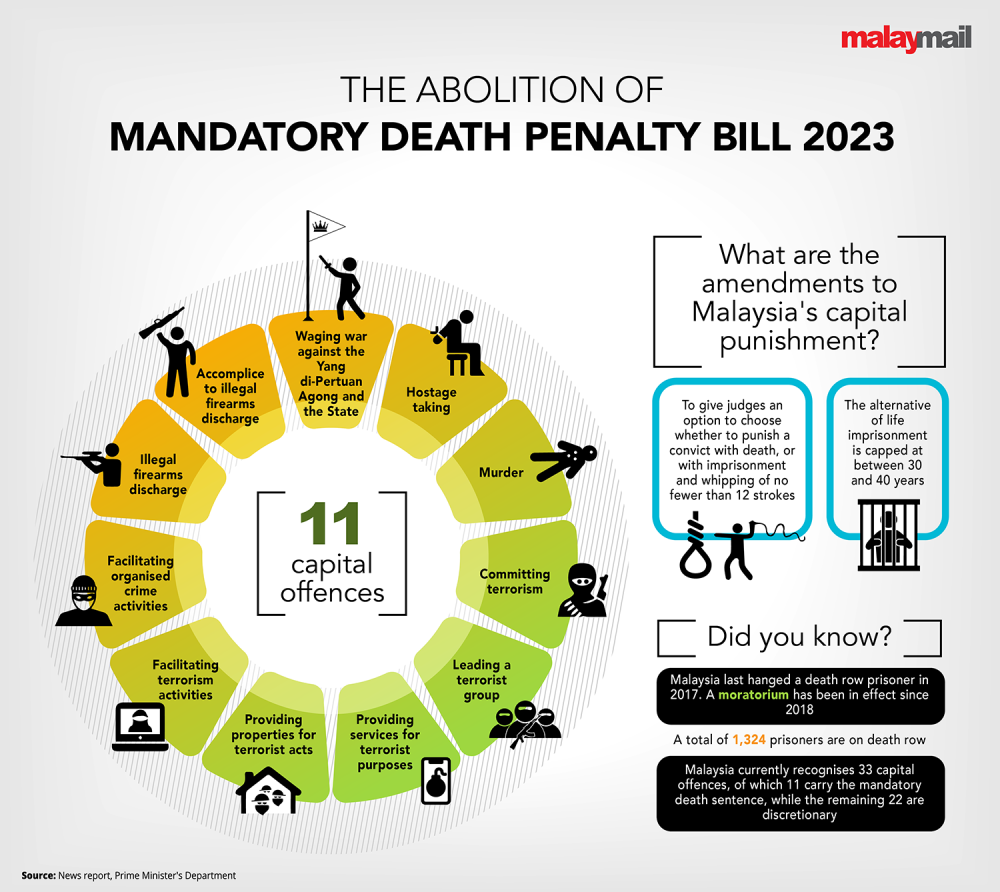Media Statement – 7/7/2023
Mandatory Death Penalty Abolished, But Review of Death Sentence Cannot Start Until Minister Puts Into Force the Revision of Sentence law.
MADPET (Malaysians Against Death Penalty and Torture) celebrates the putting into force on 4/7/2023 by Minister Azalina Othman Said, the Minister in the Prime Minister’s Department (Law and Institutional Reform) the Abolition Of Mandatory Death Penalty Act 2023, which was gazetted after receiving royal assent on 16/6/2023. This ends the era where judges had no choice but to sentence to death any person found guilty of some 11 offences that had the mandatory death penalty.
Put the Revision of Sentence Act into force so sentence revision can begin
MADPET urges that Revision of Sentence of Death and Imprisonment for Natural Life (Temporary Jurisdiction Of The Federal Court) Act 2023(Revision of Sentence Act), which was also gazetted on 16/6/2023 be immediately put into force, so the Act will come into operation.
This is most important for the about 850 of about 1324 persons on death row, who have exhausted all appeals that now qualify to apply for a revision of sentence. He/she ‘…who is sentenced to death may make an application in writing to the Federal Court within ninety days from the date of coming into operation of this Act…(2) Upon receiving an application under subsection (1), the Federal Court shall review the sentence of death.’(Sec.3(1) and (2)Revision of Sentence Act].
Only after it is in force, can the many persons ‘…who is serving a sentence of imprisonment for natural life may make an application in writing to the Federal Court within ninety days from the date of coming into operation of this Act. (2) Upon receiving an application under subsection (1), the Federal Court shall review the sentence of imprisonment of natural life.’ {Sec.5(1) and (2)]
Government needs to assist in the review of sentence application and process
Given that there will be possibly about 1,000 or more review of sentence applications filed and have to be heard by the already busy Federal Court, it is important that the State also plays an active part in assisting those who become entitled to make a review of sentence applications to ensure justice be done, and the objects of these new laws is given full effect speedily. This will also need assistance from the Prisons Departments, Public Prosecutor, Courts and others.
MADPET also calls on the Malaysian Bar, who has been a strong advocate for abolition, since the passing of the Bar Resolution calling for abolition of the death penalty in 2006, to step up and assist in the review of sentence process.
Judges Need To Note That Malaysia today is clearly for abolition of the death penalty since 2018
MADPET hopes that the Court, in hearing this sentence review applications will note that Malaysia has long adopted the position of moving towards the abolition of the death penalty in line with the global trend. In 2007, there were 104 nation states in favour of abolition. That number in favour has been systematically growing over the years. In 2008, it was 106. In 2010, it was 108. In 2012, it jumped to 111, and in 2016, it was 117 and now in 2022, it was 125, which meant more than two third of UN member States are for abolition.
On 15/12/2022, Malaysia was proudly amongst the 125 countries that voted in favor of the UN General Assembly’s “Moratorium on the use of the death penalty with a view to abolishing the death penalty” resolution.
Malaysia, under the Pakatan Harapan Plus government, voted for the very first time in favour of this resolution in 2018. The Perikatan Nasional (BERSATU, PAS included) and BN Plus Government again vote in favour the resolution in 2020.
PM Ismail Sabri, then PM Anwar Ibrahim brought about abolition of mandatory death penalty
On 6/10/2022, the Perikatan Nasional government under Prime Minister Ismail Sabri tabled 7 Bills that would abolish the mandatory death penalty, and this was the first concrete action by the government.
Post GE15, the new Bills were tabled, and now the Abolition Of Mandatory Death Penalty Act 2023 abolished not just the mandatory death penalty but also natural life imprisonment. The PH-led government also tabled the law, Revision of Sentence of Death and Imprisonment for Natural Life (Temporary Jurisdiction of The Federal Court) Act 2023, which is still not in force, allows those on death row and those under life imprisonment to apply to court for a review of the sentence.
In short, both the current government and the Opposition parties have now adopted the position of moving towards the abolition of the death penalty.
Justice Demands Court’s Understanding and Flexibility
Noting that in all cases that carried the mandatory death penalty, both the prosecution and lawyers representing the accused would have failed to adduce evidence that would have convinced the court to sentence the convicted to a lower sentence because it was of no use as the courts could only impose one sentence - the death penalty.
In these cases, which then carried the mandatory death penalty, there would have also been no submission of aggravating and mitigating factors that judges would consider before passing sentence, as there was only one sentence available - the death penalty.
As such, when it comes to the review of sentence of death now, there may be a need for serious re-evaluation of the court records and the facts, and justice may require the introduction of material new evidence, where it is hope that the court would be flexible in this extraordinary special situation.
Whipping, very different from the Islamic Caning, Must Be Abolished
Whilst, the Abolition of Mandatory Death Penalty Act would give judges the discretion on conviction to impose the death penalty or alternatively jail of between 30 and 40 years as well as no fewer than 12 strokes of the cane or whipping, MADPET calls for the abolition of whipping, and for the granting of greater discretion in sentencing maybe jail between 10 and 40 years.
Now, that Malaysia has abolished mandatory death penalty, MADPET reiterates its call for Malaysia to totally abolish the death penalty. Maybe, the next step towards total abolition is the abolition of death penalty for offences where there is no victim that is killed or seriously injured by the perpetrator.
Charles Hector
For and on behalf of MADPET(Malaysians Against Death Penalty and Torture)
The government is urged to put into force a revision of the law pertaining to death sentences, so some 850 death row inmates can seek a review of their sentence.
The Revision of Sentence of Death and Imprisonment for Natural Life (Temporary Jurisdiction Of The Federal Court) Act 2023 (Revision of Sentence Act) was gazetted on June 6 but is not yet in force.
By enforcing it, some 850 of 1,324 persons on death row, who have exhausted all appeals, will qualify for a revision of sentence, the Malaysians Against Death Penalty and Torture (Madpet) spokesperson Charles Hector (above) said.
This comes after the government announced that the Abolition of Mandatory Death Penalty Act came into force on July 4, allowing judges discretion on the type of sentence meted out to those convicted on some 11 offences.
Hector said besides putting the Revision of Sentence Act into force, the government should also assist the 850 inmates in submitting their review applications.
This is because the Revision of Sentence Act states all applications must be made in writing to the Federal Court within 90 days of the law coming into force.
This would place pressure on both the inmates and the system to process the applications which would be submitted at around the same time, Hector (above) said.
The applications would also likely come from those who have not yet exhausted all appeals, and as such, the number could be higher than 850.
"Given that there will be possibly about 1,000 or more reviews of sentence applications filed and have to be heard by the already busy Federal Court, it is important that the state also plays an active part in assisting those who become entitled to make a review of sentence applications to ensure justice be done, and the objects of these new laws are given full effect speedily.
"This will also need assistance from the Prisons Departments, public prosecutor, courts, and others," Hector said.
He also called on the Bar Council, which has been a strong advocate against the death penalty, to assist death row inmates applying for a review of their sentence.

He also sought understanding and flexibility from the Federal Court in reviewing the applications, and not only rely on adduced evidence.
He said this is because when the death row inmates were convicted, they would likely not have adduced much mitigating evidence.
This is because this evidence is usually adduced to seek a lower sentence, and this is not an option in offences which carried mandatory death sentences.
"As such, when it comes to the review of the death sentence now, there may be a need for serious re-evaluation of the court records and the facts, and justice may require the introduction of material new evidence, where it is hoped that the court would be flexible in this extraordinary special situation," Hector said.
He added that the court should also take cognizance of the fact that the Malaysian government, under multiple administrations, has consistently voted for a moratorium of the use of the death penalty, with a view to abolishing the death penalty by the UN General Assembly.
The Abolition of the Mandatory Death Penalty Act was also passed during the Perikatan Nasional government, under BN leader Ismail Sabri Yaakob, while the Revision of Sentence Act was tabled by the Pakatan Harapan-led government.
"In short, both the current government and the opposition parties have now adopted the position of moving towards the abolition of the death penalty," Hector said.
Abolish whipping
Meanwhile, Hector called on the government to abolish whipping as an alternate sentence to the death penalty.
The Abolition of the Mandatory Death Penalty Act allows judges the discretion to impose a death penalty or jail of between 30 and 40 years as well as not fewer than 12 strokes of the cane, or whipping.
Instead, Hector said, judges should be allowed the discretion of sentencing between 10 and 40 years, without the need for whipping.
He also
urged the government to take the next step towards total abolition of
the death penalty, in cases where there is no victim killed or seriously
injured. - Malaysiakini, 7/7/2023
Abolishment of mandatory death penalty gazetted, to come into force tomorrow

KUALA LUMPUR, July 3 — The abolishment of the mandatory death penalty will come into force tomorrow as the Abolition of Mandatory Death Penalty Act 2023 has been gazetted.
Malay Mail’s check with the Malaysia Federal Legislation website showed the gazettement dated June 30, 2023 and signed by de facto law minister Datuk Seri Azalina Othman Said was uploaded today.
“In exercise of the powers conferred by subsection 1(2) of the Abolition of Mandatory Death Penalty Act 2023 (Act 846), the minister appoints July 4 2023 as the date on which the Act comes into operation,” said the statement.
The Dewan Rakyat passed the Bill proposing to make the death penalty an option and no longer mandatory after it was tabled for its third reading on April 3.

The Abolition of Mandatory Death Penalty Bill would give judges the discretion on the death penalty rather than requiring them to do so when convicting on offences that made them mandatory.
The amendments in the Bill also include replacing life and natural life imprisonment (until death) as an alternative to the mandatory death sentence, with the new alternative of jail of between 30 and 40 years as well as no fewer than 12 strokes of the cane.
The Abolition of Mandatory Death Penalty Bill 2023 was tabled for first reading in the Dewan Rakyat by Minister in the Prime Minister’s Department (Law and Institutional Reform) Datuk Seri Azalina Othman Said on March 27 this year.
Azalina’s predecessor, Datuk Seri Wan Junaidi Tuanku Jaafar, had tabled a similar piece of legislation on October 6, 2022, but Parliament’s dissolution to pave the way for the 15th General Election meant it was never put before lawmakers for debate.
Since July 2018, Malaysia has placed a de facto moratorium on executions pending institutional reforms undertaken by the various administrations that have existed in that time.
The last death row prisoner was hanged in 2017 but because legislation carrying the mandatory death penalty has remained effective, the courts have been bound to continue sentencing defendants to death despite the moratorium on executions.
Read here for Malay Mail's explainer on the brief history of capital punishment and death row inmates in Malaysia. - Malay Mail, 3/7/2023
A brief history of Malaysia’s capital punishment and death row inmates

KUALA LUMPUR, April 3 — Decades after colonial rule, Malaysia has finally taken the first concrete steps towards abolishing the death penalty, after proposed legislation to make capital punishment optional and not mandatory was put before Parliament a second time.
The Abolition of Mandatory Death Penalty Bill 2023 was tabled for first reading in the Dewan Rakyat by Minister in the Prime Minister’s Department (Law and Institutional Reform) Datuk Seri Azalina Othman Said on March 27.
Azalina’s predecessor, Datuk Seri Wan Junaidi Tuanku Jaafar, had tabled a similar piece of legislation on October 6, 2022, but Parliament’s dissolution to pave the way for the 15th General Election meant it was never put before lawmakers for debate.
“Legal amendments involving policies on punishment and substitute sentence to the mandatory death penalty are a positive change to make the country’s criminal justice system more holistic and inclusive, apart from not denying individuals their basic right to proper justice,” Azalina told the Dewan Negara days before the Bill’s tabled for the first reading.
The current Bill seeks to revise the current death penalty by giving judges the discretion to mete out sentences on a case-by-case basis.
The amendments also include replacing life and natural life imprisonment (until death) as an alternative to the mandatory death sentence, with the new alternative of jail of between 30 and 40 years as well as no fewer than 12 strokes of the cane.
For the amendments to take effect, the Bill must obtain approval by way of three readings from both the Dewan Rakyat and Dewan Negara, before being presented to the Yang di-Pertuan Agong for royal assent and subsequently gazetted.
Since July 2018, Malaysia has placed a de facto moratorium on executions pending institutional reforms undertaken by the various administrations that have existed in that time.
The last death row prisoner was hanged in 2017 but because legislation carrying the mandatory death penalty has remained effective, the courts have been bound to continue sentencing defendants to death despite the moratorium on executions.
A brief history of Malaysia’s capital punishment
The death penalty has occupied a place in the Malaysian criminal justice system ever since British colonial administration, when the mandatory death penalty was originally enforced for murder.
When Malaya achieved independence in 1957, it inherited the common law system including the death penalty introduced during the reign of British Malaya.
Did you know the well-known Dangerous Drugs Act was enacted by the British colonial government in 1952 to combat the threat of substance abuse, yet capital punishment for drug trafficking — under Section 39B — was not carried out until 1975?
The death penalty remained discretionary for Section 39B up until 1983 when the legal provision was amended to make it mandatory, after which Malaysia’s drug laws would go on to be considered as among the harshest in the world.
Today in Malaysia, 34 offences such as murder, drug trafficking, waging war against the state and terrorism were punishable by death. Of those, 11 carried a mandatory death sentence.
Executions are performed as hanging by the neck until death, and usually conducted on Fridays.
At present, Malaysia is one of 53 countries worldwide that still maintain the death penalty in both law and practice.

What are the numbers?
According to the Prison Department’s latest data, a total of 1,318 prisoners were sent to the gallows between 1992 and 2023 for one of seven capital offences that carried the mandatory death penalty.
The capital offences listed are Section 121, 302 and 396 of the Penal Code for waging war against a Ruler, murder and gang-robbery with murder, respectively; Section 39B of the Dangerous Drugs Act for drug trafficking; Section 3 of the Kidnapping Act for abduction for ransom; and Section 3 and 3A of the Firearms (Increased Penalties) Act for illegal firearms discharge.
The majority of the condemned — 870 of them or 66 per cent — comprised drug offenders, followed by convicted murderers at 318 or 24.1 per cent.
For the remainder, 16 were convicted for illegal firearms discharge, seven for waging war against the Agong, five for kidnapping, and two for gang-robberies.
Despite the movements to reform the death penalty, 2022 also saw the highest number of condemned persons at 123, of which 79 or 64.2 per cent were drug offenders followed by 44 or 35.8 per cent convicted of murder.
The Abolition of Mandatory Death Penalty Bill seeks to abolish the mandatory death penalty, to vary the sentence of imprisonment for natural life and whipping, and to provide for matters connected therewith by amending the Penal Code (Act 574), the Firearms (Increased Penalties) Act 1971 (Act 37), the Arms Act 1960 (Act 206), the Kidnapping Act 1961 (Act 365), the Dangerous Drugs Act 1952 (Act 234), the Strategic Trade Act 2010 (Act 708) and the Criminal Procedure Code (Act 593) in line with the Government policy to abolish the mandatory death penalty in all legislation. - Malay Mail, 3/4/2023
Malaysia, amongst 125 countries, that voted in favour of the 2022 UN General Assembly Resolution towards abolition of the Death Penalty on 15/12/2022
Media Statement – 18/12/2022
Malaysia, amongst 125 countries, that voted in favour of the 2022 UN General Assembly Resolution towards abolition of the Death Penalty
On 15/12/2022, at Seventy-seventh Session 54th Meeting, the UN General Assembly’s adopted the “Moratorium on the use of the death penalty with a view to abolishing the death penalty” resolution. MADPET is proud that Malaysia was one of 125 nation states that voted in favour. Singapore and Brunei, sadly, were the only ASEAN member states amongst the 37 countries that voted against, and there were 22 abstentions.
This is an historic moment, when majority of two thirds was achieved, and the number of votes in favour continues to increase. In 2020, there were 123 votes in favour to 38 against, with 24 abstentions. In 2018, it was 121 votes in favour, which also included Malaysia for the very first time.
In 2007, there were 104 in favour. In 2008, it was 106. In 2010, it was 108. In 2012, it jumped to 111, and in 2016, it was 117. As such, the global trend continues to be towards the abolition of the death penalty
On 15/12/2022, after adoption of the Resolution, ‘the Assembly called on States to progressively restrict use of the death penalty and ensure that those facing it can exercise their right to apply for pardon or commutation… In addition, it called on States to ensure the death penalty is not applied based on discriminatory laws, improve conditions in detention and establish a moratorium on executions with a view to abolishing the death penalty…’(UN Meetings Coverage of GA)
MADPET (Malaysians Against Death Penalty and Torture) is proud that Malaysia voted in favour of this Resolution that unequivocally calls for all countries to establish a moratorium on executions with a view to abolishing the death penalty.
Malaysia, under the Pakatan Harapan Plus government, voted in favour of this resolution in 2018. The Perikatan Nasional(BERSATU, PAS included) and BN Plus Government elected to again vote in favour in 2020. Now, the Pakatan Harapan Plus government under Prime Minister Anwar Ibrahim has taken the same stance in December 2022.
MADPET notes that Bills are now before the Parliament that will effectively abolish the mandatory death penalty, which we call all on MPs to vote in favour. This can be considered the first step towards abolition.
Thereafter, we call on the Prime Minister Anwar Ibrahim’s Coalition Government led by Pakatan Harapan and to forthwith take the next step and abolish the death penalty in Malaysia speedily.
We recall that the then Minister in the Prime Minister’s Department of the then PH Plus Government, Datuk Liew Vui Keong on 13/11/2018 in Parliament did say that ‘…the Cabinet has decided that the death penalty for 33 offences under eight acts of law be abolished, and this includes Section 302 of the Penal Code (murder)...He said the decision, which was reached collectively, also encompassed the Firearms (Heavier Penalties) Act 1971; Firearms Act 1960, Kidnapping Act 1961, Armed Forces Act 1972. Also in the list are the Water Services Industries Act 2006; Strategic Trade Act 2010 and Dangerous Drugs Act 1952. ..’(Malay Mail 13/11/2018).
When a country, especially a democratic nation State, executes a criminal, it inevitably makes all its citizens ‘murderers’.
A criminal reasonably must be punished for his/her crimes, but his life must never be extinguished. Sentencing must be fair, consistent, proportionate and with the opportunity for rehabilitation. The abolition of the death penalty, in favour of repentance, rehabilitation and second chances is consistent with the values of the different religions and cultures of the Malaysian people.
MADPET reiterates our call for the abolition of the death penalty, and for the moratorium on executions pending abolition.
Charles Hector
For and on behalf of MADPET(Malaysians Against Death Penalty and Torture)





No comments:
Post a Comment